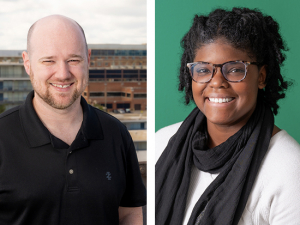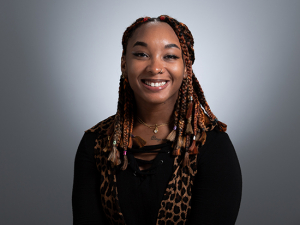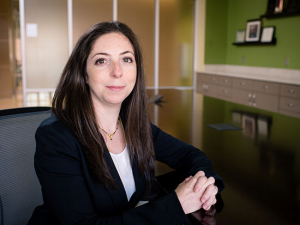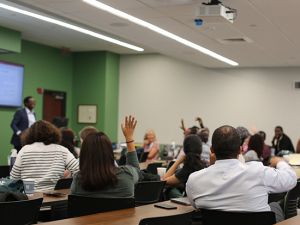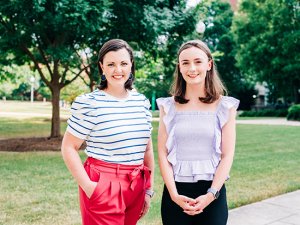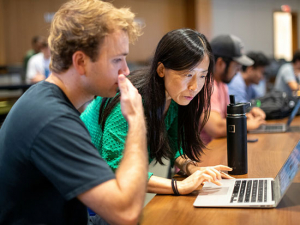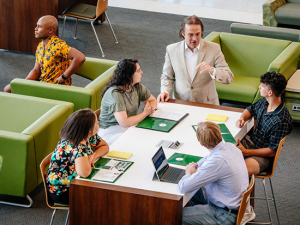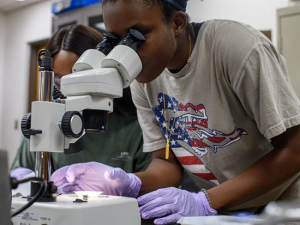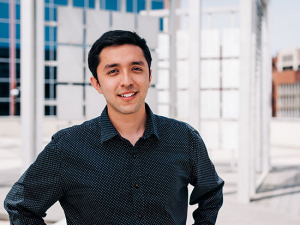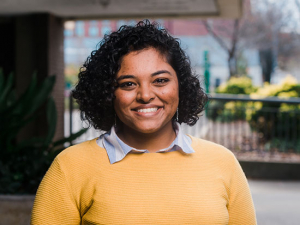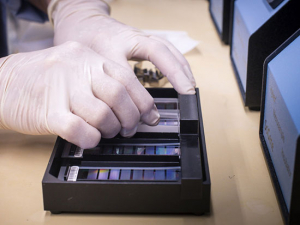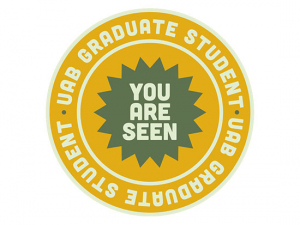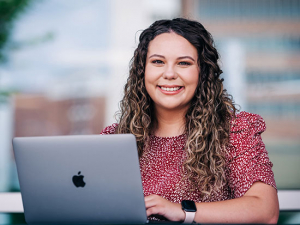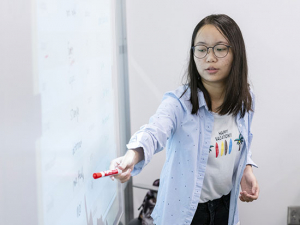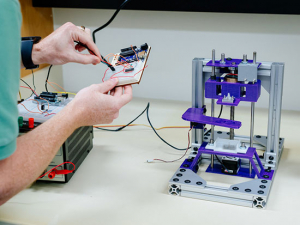 Do you picture yourself teaching English overseas — or in your local school? Learn more about what sets UAB's ESL teacher certification programs apart.There are easier ways to earn a graduate degree in English as a Second Language (ESL) than to enroll at UAB. Just ask Susan Spezzini, Ph.D., who directs the university's innovative ESL teacher preparation program.
Do you picture yourself teaching English overseas — or in your local school? Learn more about what sets UAB's ESL teacher certification programs apart.There are easier ways to earn a graduate degree in English as a Second Language (ESL) than to enroll at UAB. Just ask Susan Spezzini, Ph.D., who directs the university's innovative ESL teacher preparation program.
Spezzini has worked with hundreds of students who want to help others learn English, in their own classrooms or the classrooms where they hope to teach one day. When they call, stop by her office or send an email, Spezzini uses several questions to help them find their way.
1. What do you want to get from your education?
"We are not the only ESL teacher certification program in the state," Spezzini said. " Some people want a faster, less expensive model with minimal work. However, at, UAB, we have an ESL master’s degree with national recognition." In 2020, UAB’s ESL master’s program was recognized by the Council for the Accreditation of Educator Preparation, the only one in Alabama to achieve this distinction.
National recognition is a result of the program’s comprehensive training — training so thorough that more than one graduate of another program has found out about what UAB is teaching from a workplace colleague and then asked Spezzini for permission to audit courses that simply weren’t offered where they earned their degree. Spezzini’s response was to invite them to pursue the next degree at UAB — Educational Specialist (EdS) in Teaching English to Speakers of Other Languages (TESOL).
“I looked at other universities, but UAB just stood out as the best in the Southeast.”
— Christina Thurman, student in the EdS-TESOL program and English Learner Specialist in the Autauga County Schools system
Classroom teachers often hear about UAB’s program from colleagues. “It came highly recommended,” said Christina Thurman, an English Learner Specialist in the Autauga County Schools system in Prattville, Alabama. Thurman is a student in UAB’s EdS-TESOL program, which is a post-master’s degree. “I looked at other universities, but UAB just stood out as the best in the Southeast,” Thurman said.
“There has been nothing that has affected my day-to-day practice in a general education classroom more than this master’s degree program,” said Chad Strawn, an ESL teacher in Etowah County, Alabama, and a 2012 graduate of the Master of Arts in Education in ESL. “But it has also changed who I am. I’m just not the same teacher I was before this program — I’m not even the same person.”
What accounts for this change? Ask students and alumni about their favorite course and nearly all point to Spezzini's class in phonology, which is the study of sound systems in languages. If you only speak one language, "you are only hearing the sounds of your native language, and that is not how your students are experiencing the world,” Spezzini said. To truly succeed at teaching English to non-native speakers of English, "you should learn about the sounds in other languages,” she tells her graduate students.
Enroll today
Start the admission process here, and see upcoming application deadlines. Got questions for Spezzini? Send her an email or call 205-934-8357.
“There are many more sounds than the letters in our alphabet,” Spezzini said. "After teaching a little bit about anatomy related to sound production, we have our graduate students learn the international phonetic symbols for each sound in the English language and its regional variations. To help English learners pronounce English sounds in a comprehensible way, teachers need to learn the sound system, and that does involve a series of tests, which many of my graduate students haven’t had to do since they were undergraduates.”
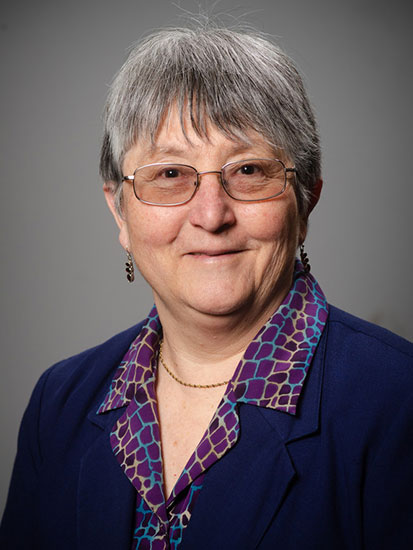 If you only speak one language, "you are only hearing the sounds of your native language, and that is not how your students are experiencing the world,” said Susan Spezzini, Ph.D. (above), who directs UAB's ESL teacher preparation program. To truly succeed at teaching English to non-native speakers of English, "you should learn about the sounds in other languages,” she tells her graduate students.But the effort is worth it, Spezzini and program alumni say. “Elementary and secondary teachers are often trained to think that language is primarily a writing system based on an alphabet,” Spezzini explained. “Once they have the knowledge of these sounds and know how to hear them, they are totally blown away. Everything changes.”
If you only speak one language, "you are only hearing the sounds of your native language, and that is not how your students are experiencing the world,” said Susan Spezzini, Ph.D. (above), who directs UAB's ESL teacher preparation program. To truly succeed at teaching English to non-native speakers of English, "you should learn about the sounds in other languages,” she tells her graduate students.But the effort is worth it, Spezzini and program alumni say. “Elementary and secondary teachers are often trained to think that language is primarily a writing system based on an alphabet,” Spezzini explained. “Once they have the knowledge of these sounds and know how to hear them, they are totally blown away. Everything changes.”
Throughout the phonology course, graduate students have “these sudden flashes of insight,” Spezzini said. For example, when English learners arrive in American schools, they often get in trouble for using inappropriate words, she says. But “it is impossible for English learners to differentiate between ‘beach’ and ‘bitch,’” Spezzini said. “They don’t hear the difference between the vowels in these two words because their language doesn’t make that distinction. You interpret sounds in your new language in the same way you interpret them in your original language. So when English learners try to say ‘beach,’ it is heard as ‘bitch,’ and this leads to their being punished because teachers want to treat everyone equally. Learning about this is a phenomenal breakthrough for my graduate students. They say, ‘That explains so much of what I have seen in my classroom!’”
“As I started the program, I had many peers warn me about the phonology course — they told me to be prepared to study,” said Erin Gentry, who teaches English as a second language at Asbury High School in Albertville, Alabama. Gentry began the ESL master’s program at UAB in spring 2020 “after I had decided that teaching English language learners was my passion in my teaching career,” she said. “I have learned more from Dr. Spezzini’s phonology class than any class I have taken throughout my college career. I am forever grateful for this newfound knowledge as it is helping me to be a better teacher for my students.”
2. How are you planning to pay for your education?
National recognition for UAB’s ESL teacher preparation programs also is a major factor behind the program’s success in attracting federal grants from the Department of Education’s Office of English Language Acquisition — $15 million since 2002 — Spezzini said. “And about half of that money has paid for tuition.” Since 2002, UAB has had 680 teachers earn ESL teacher certification from the state and "about 70 percent of them received tuition support from our federal grants,” Spezzini said.
3. Do you have a teaching certificate? If not, do you want one?
The Master of Arts in Education degree for teaching ESL has three tracks.
Global reach
More than 800 program alumni teach in 41 countries on six continents, along with 32 states in the United States and 43 Alabama counties.
Within the Master of Arts in Education for ESL, the traditional track is designed for professionals who “are already K-12 teachers with certification from the state,” Spezzini said. “This degree track gives them a higher level of certification and a pay raise across the state.”
With an ESL master’s from UAB, “I entered my job knowing exactly what I needed to do to effectively make a meaningful, positive impact in my students' lives and in the lives of their families and my fellow teachers,” said Erika Bell Turner, a 2011 graduate and current English Language Lead Teacher for Saks Elementary, Middle and High Schools in Calhoun County, Alabama. “It is one of the most meaningful things I've ever accomplished, and I'm so grateful for my time there.”
Students who do not already have state teaching certification — a group that includes many teachers in private schools, teachers overseas and individuals with experience teaching adult learners — can enroll in the ESL master’s alternative track, which includes "all the teacher prep education courses they need to earn initial teacher certification, plus the ESL courses," all in 44 total credit hours, Spezzini said. (The traditional ESL master's program is 30 credit hours.)
“There has been nothing that has affected my day-to-day practice in a general education classroom more than this master’s degree program. But it has also changed who I am. I’m just not the same teacher I was before this program — I’m not even the same person.”
— Chad Strawn, 2012 graduate of the Master of Arts in Education in ESL program and ESL teacher in Etowah County
“Twenty-five years after getting my B.A. in psychology, I decided to go back to school for a master’s degree,” said Judy Ayala, who is an ESL teaching assistant with Dothan City Schools in Dothan, Alabama, and plans to become a certified ESL teacher. “Upon being admitted to this degree, I became eligible to be hired as an ESL teacher with an Interim Employment Certificate,” she said. “This was a great benefit.”
Ayala “was very apprehensive at first,” she said. “I felt I wasn’t going to enjoy it or be challenged enough. I was also extremely intimidated by the ‘digital world.’ But my advice for older students is that it is okay to be apprehensive. But know — be certain — that UAB cares about your success and the professors will provide guidance every step of the way. All the instructors are very helpful, clear about their class expectations, give excellent instructions on how to complete online assignments, challenge students academically and care about our success.”
The EdS in TESOL has certification and non-certification options. Teachers who already hold ESL teacher certification at the master’s level can earn this 30-hour degree on the Certification Track, "which gives another salary bump," Spezzini said. Others with master’s certification in another field or an ESL master’s for teaching adults will earn this degree on its non-certification track.
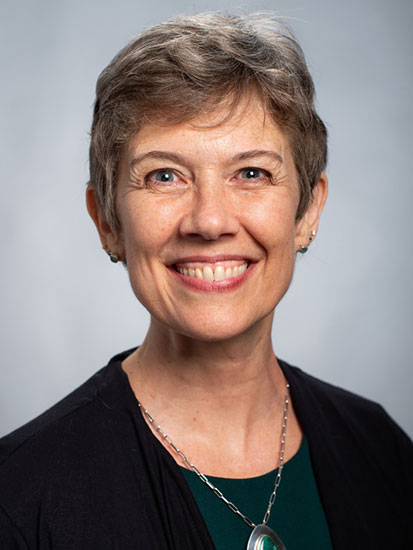 UAB's ESL program offers 29 adult settings for clinical practice. "Our master’s students need this type of opportunity,” said Josephine Prado, Ph.D. (above), assistant professor of English Learner Education in the Department of Curriculum and Instruction. “Some people have never stood in front of a classroom, particularly facing a class of adult learners. And that can be a scary thing.”"The professors at UAB were extremely supportive, knowledgeable and responsive to my learning needs in regard to our state's individual context,” said Gwyneth Fastnacht, ESL specialist in South Dakota. Fastnacht earned an EdS degree in education with an emphasis in ESL at UAB in 2018. “I have been inspired by the teachers and made life-long mentors and friends through the ESL education program at UAB," she said.
UAB's ESL program offers 29 adult settings for clinical practice. "Our master’s students need this type of opportunity,” said Josephine Prado, Ph.D. (above), assistant professor of English Learner Education in the Department of Curriculum and Instruction. “Some people have never stood in front of a classroom, particularly facing a class of adult learners. And that can be a scary thing.”"The professors at UAB were extremely supportive, knowledgeable and responsive to my learning needs in regard to our state's individual context,” said Gwyneth Fastnacht, ESL specialist in South Dakota. Fastnacht earned an EdS degree in education with an emphasis in ESL at UAB in 2018. “I have been inspired by the teachers and made life-long mentors and friends through the ESL education program at UAB," she said.
The program is continually expanding; the latest addition is a four-course graduate certificate in Teaching Multilingual Learners that graduate students can take independently of a degree or undergraduates can complete during their studies. “When undergraduate students complete this graduate certificate, they receive their certificate at the Graduate School’s commencement on Friday and their undergraduate degree on Saturday with their peers,” Spezzini said.
4. Do you want to teach children or adults?
“I decided to enroll in the ESL master’s alternative track because I wanted to get my initial teaching license to be able to teach at international schools around the world,” said Taylor Ausbon, who is teaching ESL at an elementary school in Huntsville, Alabama. “I started teaching in Taiwan at a small English learning company and loved it.” He wanted to start teaching at an international school, but this required a teaching license. “Plus, I wanted to learn more about the field and reflect on things I did in Taiwan before having educational teaching knowledge,” Ausbon said. “I have loved being in UAB’s ESL program. It’s the first time I’ve been in a program that I really enjoyed the content I’m learning.”
“I have learned more from Dr. Spezzini’s phonology class than any class I have taken throughout my college career. I am forever grateful for this newfound knowledge as it is helping me to be a better teacher for my students.”
— Erin Gentry, student in the ESL master's program and ESL teacher in Albertville, Alabama
Like Ausbon, many students in UAB’s ESL teacher preparation program have a desire to work internationally. More than 800 program alumni have taught in 41 countries on six continents, along with 32 states in the United States and 43 Alabama counties.
The ESL Master’s Non-Certification Track is designed for students who intend to teach adult learners in settings such as intensive English on college campuses, workplace English classes, refugee centers and many other settings. “My personal interest and working experience led me to TESOL,” said Jiaxu (John) Chen, who is taking classes online from China and eventually plans to pursue a doctoral degree and research. “Top experts get to put their paper on the desk of the Chinese president, and thus I can actually make a major difference.”
Chen said he was impressed by the personal attention he received from the moment he contacted Spezzini. “Dr. Spezzini helped me with everything including the admission process,” he said. On a call with Spezzini and another key faculty member, Josephine Prado, Ph.D., assistant professor of English Learner Education in the Department of Curriculum and Instruction, Chen was nervous. But “that interview gave me an idea of what the faculty is like,” he said. “They are all lovely people” with obvious love for their students, he added.
5. Are you prepared for a lifelong journey?
Current students and alumni say the program's continual support is phenomenal. “Connecting with the professors is going to be the greatest thing you can do for your career,” Ausbon said. “They helped me get an ESL teaching position in Huntsville and continually check on me to see how I am doing.”
“I entered my job knowing exactly what I needed to do to effectively make a meaningful, positive impact in my students' lives and in the lives of their families and my fellow teachers.”
— Erika Bell Turner, a 2011 graduate of the ESL master's program and English Language Lead Teacher in Calhoun County, Alabama
Many alumni of the School of Education’s ESL graduate program are employed at the INTO UAB English Language Programs, which offer intensive language instruction for college age and professional internationals. Campus classrooms also are the setting for clinical placements where ESL master’s students teach free community English classes, which is one of 29 adult settings for clinical practice. “Our master’s students need this type of opportunity to practice,” Prado said. “Some people have never stood in front of a classroom, particularly facing a class of adult learners. And that can be a scary thing.”
"What is the best part about the ESL program at UAB? I would feel comfortable contacting any of my previous professors from the program, and they would still be willing to help and support me," said Stephanie Montiel, a former Peace Corps volunteer in Paraguay and current ESL teacher with the Gulf Shores school system in Alabama, who earned a master's degree in ESL in 2008 and an EdS degree in 2018.
“Connecting with the professors is going to be the greatest thing you can do for your career. They helped me get an ESL teaching position in Huntsville and continually check on me to see how I am doing.”
— Taylor Ausbon, student in the ESL master's alternative track
UAB’s ESL programs have attracted students from around the world. “You don’t need to know another language to be an effective ESL teacher,” Spezzini said. “It helps in empathizing with your students, and in communicating with their parents if they are younger, but it does not necessarily help in teaching. In fact, some of the students in our master’s program whose first languages were Italian, Arabic, Chinese and Turkish and have gone on to use what they learned in TESOL to teach their own home language better.”
UAB’s ESL teacher education program celebrated its 20th anniversary in 2019 and continues to expand. At that anniversary celebration, the SOE dean launched the Julia S. Austin Endowed Scholarship, honoring the program’s first director. With 815 alumni currently, the growth of ESL teacher education at UAB during the past two decades has been due in large part to support from the School of Education and the university community at large, Spezzini and Prado note: “We as ESL faculty feel very fortunate for the support that we have received from the Curriculum & Instruction Department and the School of Education.”
